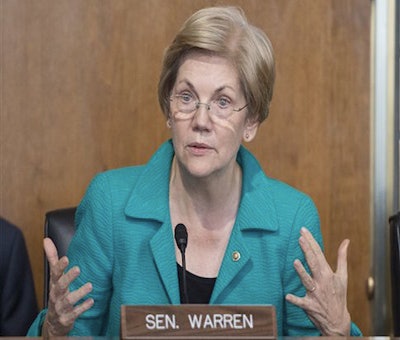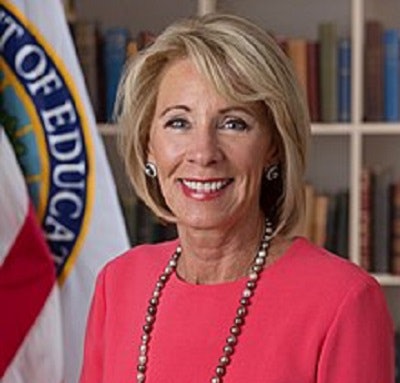Three Senators joined 18 state attorneys general and a leading academic association to urge the Department of Education and the Office of Management and Budget to suspend changes to Title IX rules on dating violence, domestic abuse and stalking.
Citing the closures of schools and colleges around the country due to the COVID-19 pandemic and the subsequent disruptions of revenue and resources, the attorneys general led by Pennsylvania’s Josh Shapiro stated in a March 27 letter that “in the midst of a national health emergency, the burden placed on schools would be untenable and ultimately counterproductive to student safety. … With everything our schools and students are facing right now, we strongly urge you not to impose further substantial regulatory burdens.”
 U.S. Senator Elizabeth Warren
U.S. Senator Elizabeth WarrenThe proposed changes to Title IX, the civil rights law that prohibits discrimination on the basis of gender, were announced by Secretary of Education Betsy DeVos in November 2018 and are set to go into effect this year. The new rules will modify how universities litigate sexual assault complaints by defining dating violence, domestic abuse and stalking as forms of gender discrimination that universities must address. The changes would also make it easier for schools with a religious affiliation to be exempt from Title IX.
Democratic Senators Patty Murray (Washington State), Elizabeth Warren (Massachusetts) and Kirsten Gillibrand (New York) wrote in a March 31 letter to DeVos, “We urge you not to release the final Title IX rule at this time and instead to focus on helping schools navigate the urgent issues arising from the COVID-19 pandemic that is top of the mind for all students and families.”
Other groups requesting suspension of the changes include the American Council on Education and the National Women’s Law Center. The American Association of University Professors announced agreement last week with the attorneys general, stating that the COVID-19 crisis “severely constrains the ability of educational institutions’ administrations, faculty, staff and students to engage in meaningful shared governance to address new and complex Title IX regulations.”
 Betsy DeVos
Betsy DeVosCritics of the proposed changes say some of the new rules could unfairly sway the process in favor of the accused. They also point out that the narrowed definition of sexual harassment would require schools to ignore sexual harassment until it becomes “repeated and severe,” and that the new requirements for grievance procedures would include cross-examination of victims.
“Secretary DeVos has fallen short yet again on a very simple and fundamental premise of her duty: to protect all students,” National Education Association President Lily Eskelsen García said when the changes were proposed in 2018. “This Trump-DeVos agenda would return schools to a time when rape, assault and harassment were swept under the rug.”
Conservatives have weighed in, with some suggesting that opponents are being disingenuous.
“Those making this argument are taking advantage of a crisis to try to keep due process out of college campuses,” a recent article in the National Review asserted, adding that DeVos’ new regulations “would ensure basic rights for accused students.”
However, Mark F. Smith, an NEA policy analyst, said at the time the rule changes were announced, “the real problem” with them was that “they will make it much less likely that victims will report incidents of harassment or violence — and these incidents already are under-reported.”

















